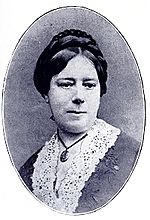Catherine Winkworth facts for kids
Quick facts for kids Catherine Winkworth |
|
|---|---|
 |
|
| Born | 13 September 1827 London |
| Died | 1 July 1878 (aged 50) Geneva |
| Venerated in | Evangelical Lutheran Church in America, Episcopal Church (United States) |
| Feast | 1 July (Lutheran) or 7 August (Episcopal) |
Catherine Winkworth (born 13 September 1827 – died 1 July 1878) was an English writer of hymns and an educator. She is famous for translating German church hymns into English. Because of her work, she is remembered in church calendars by The Episcopal Church and the Evangelical Lutheran Church in America.
Catherine also worked hard to create more chances for girls to get an education. She translated books about women who started religious groups to help the poor and sick. When she was 16, Catherine might have created a famous political joke, peccavi, which means "I have Sindh." This joke was about the British taking over a region in India called Sindh.
Contents
Early Life and Learning
Catherine Winkworth was born in London on 13 September 1827. Her father, Henry Winkworth, was a silk merchant. In 1829, her family moved to Manchester. This city was a very important place during the Industrial Revolution, a time when many new factories and industries started.
Catherine studied with important teachers. She learned from the Rev. William Gaskell and Dr. James Martineau. Both were leading members of a Christian group called British Unitarians. Being part of this group was very important in Manchester at the time. It helped shape many ideas in the city and the country.
Later, Catherine and her family moved to Clifton, near Bristol. Her sister, Susanna Winkworth, was also a translator. Susanna mainly translated German religious books.
Bringing German Hymns to English Speakers
Catherine Winkworth spent a year in Dresden, Germany. While there, she became very interested in German church hymns. Around 1854, she published her book Lyra Germanica. This book was a collection of German hymns that she had chosen and translated into English. She released another collection in 1858.
In 1863, she published The Chorale Book for England. She worked on this book with composers William Sterndale Bennett and Otto Goldschmidt. In 1869, she followed up with Christian Singers of Germany.
Many people believe that Catherine Winkworth did more than anyone else to make German hymns known in English-speaking countries. Her translations helped many people enjoy these beautiful songs. Some of her most famous translations include "Wake, Awake, for Night Is Flying" and "How Brightly Beams the Morning Star!" She also translated the Christmas hymn "A Spotless Rose."
Helping Girls Get an Education
Catherine Winkworth was very involved in helping women get better education. She was the secretary of the Clifton Association for Higher Education for Women. She also supported the Clifton High School for Girls. A school house there is even named after her.
She was also a member of Cheltenham Ladies' College. This was another important school for girls. Catherine also helped govern the Red Maids' School in Bristol.
Catherine translated the life stories of two women who started groups to help the poor and sick. These books were Life of Pastor Fliedner (1861) and Life of Amelia Sieveking (1863). Because of her work for women, Catherine Winkworth has been called an "early feminist." This means she believed in equal rights and opportunities for women.
The "Peccavi" Joke

Catherine Winkworth is famous for a clever joke. In 1844, when she was 16, she learned about General Charles James Napier's actions. He had taken over the Indian region of Sindh for Britain. It was a bold move, and some thought it was not fully authorized.
Catherine reportedly told her teacher that Napier's message to the governor-general of India should have been Peccavi. This is a Latin word that means "I have sinned." It was a funny pun because "sinned" sounds like "Sindh." She sent her joke to a new funny magazine called Punch, which printed it on 18 May 1844.
For a long time, people thought General Napier himself had made this joke. But later research, including notes from 1954, showed that Catherine Winkworth was likely the one who came up with it.
Later Life and Legacy
Catherine Winkworth died suddenly from heart disease near Geneva on 1 July 1878. She was buried in Monnetier, France. A monument was built to remember her in Bristol Cathedral.
Today, Catherine Winkworth is honored as a hymn writer. The Episcopal Church (USA) remembers her on 7 August. The Evangelical Lutheran Church in America remembers her on 1 July.
 | William L. Dawson |
 | W. E. B. Du Bois |
 | Harry Belafonte |

